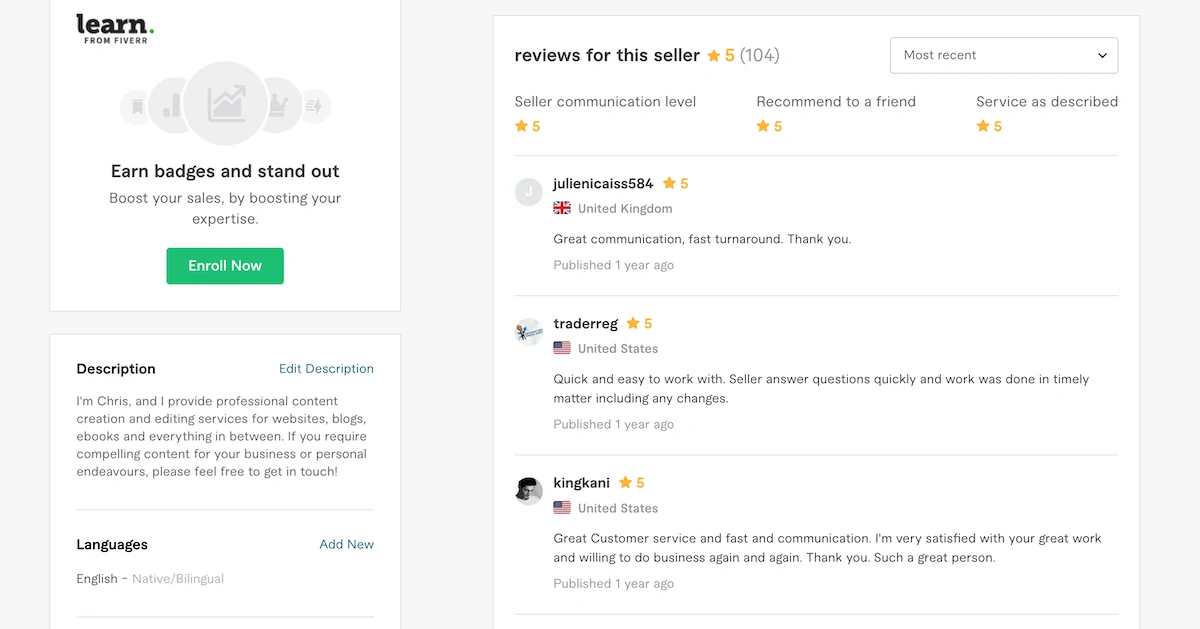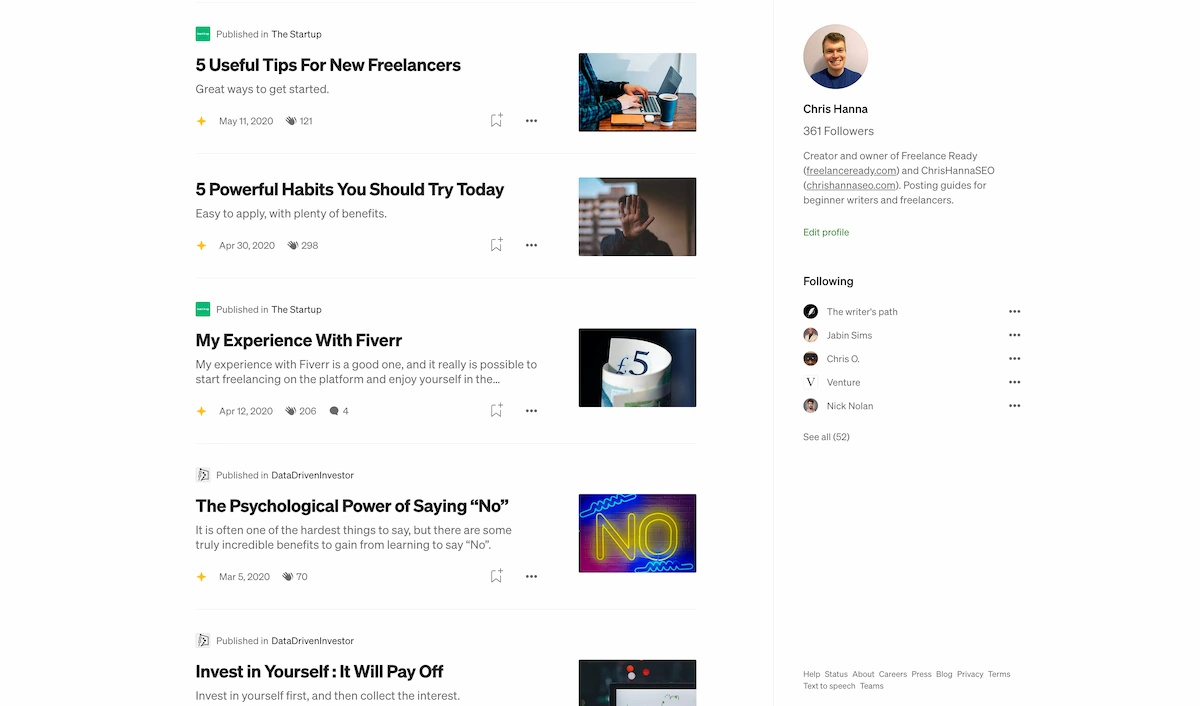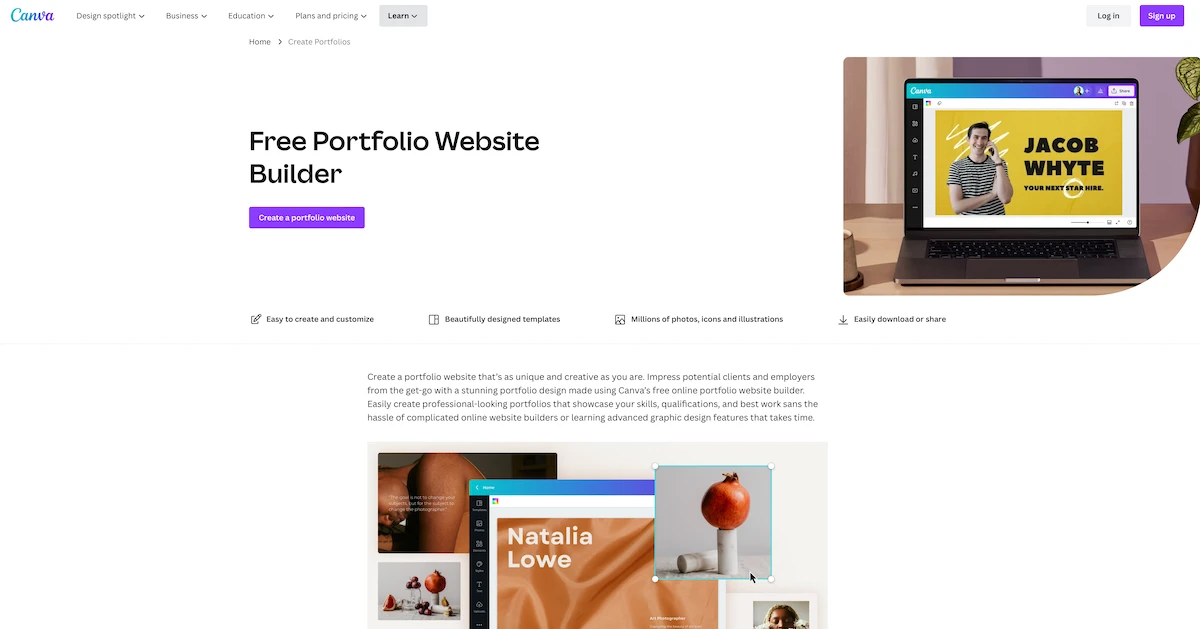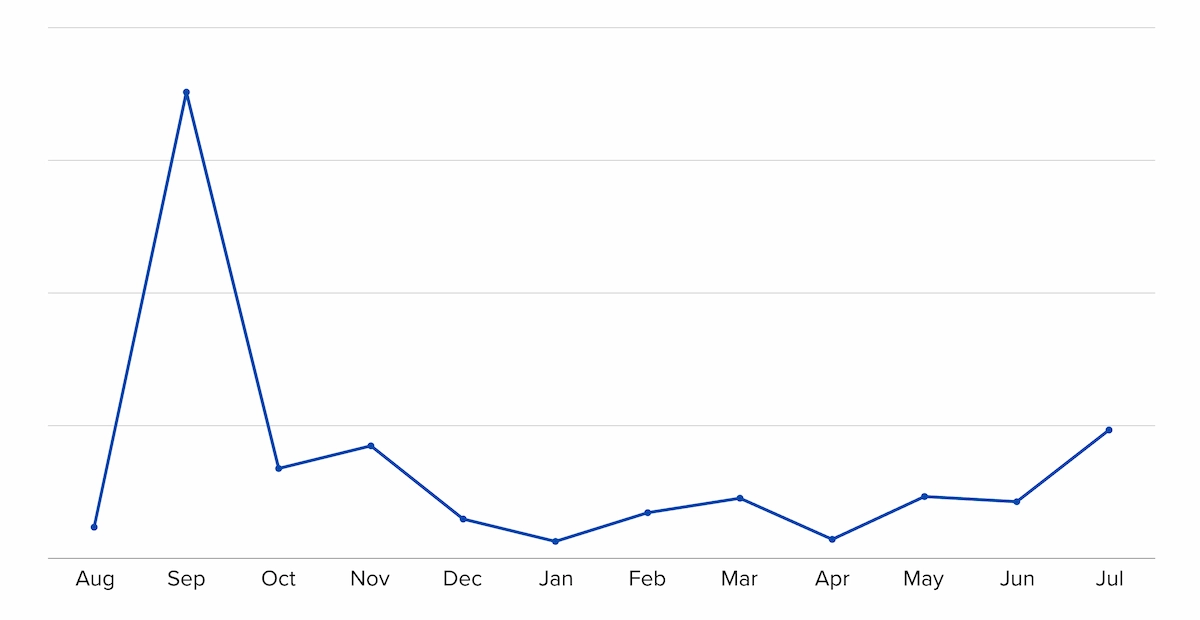You need experience to get the job, but you need the job to get experience.
Sound familiar?
It’s nothing new, but the age-old adage still applies to freelancing today. It’s HARD to break into any industry when you have no experience behind you.
Hard, but not impossible. I (and all other successful freelancers) would know—we all started freelancing with zero “freelancing experience.”
In this post, I’ll discuss how you can break into the world of freelancing and become successful in it, even if you don’t have any experience. I’ll cover creating a portfolio, finding projects and clients, building your network, setting your rates, and lots more.
Can You Start Freelancing With Zero Experience?
You can start freelancing with zero experience. Although having some prior experience will help you showcase your skills and proficiency in a certain area or industry, it is still possible to get started from scratch.
However:
While you don’t need experience selling your skills as services to become a freelancer, you will of course need experience with the skills you want to sell!
You’ll struggle to become a freelance writer if you aren’t very good at writing.
And just because you hear there is good money in freelance web development, that doesn’t mean you should become a freelance web developer if you’ve never written a line of code.
You can definitely learn freelancing skills and turn them into services. But again, you’ll need some experience and a good understanding of the skills to be able to make any money with them.
But let’s assume you do have a skill you want to sell and you have at least some experience with it. How do you start selling that as a freelancer?
Tips For Starting Freelancing With No Experience
1. Start By Working For Free
If you are just starting out and have no experience, it can be a great idea to offer some of your services for free or at heavily discounted rates. This way, you can start building up a portfolio of work that demonstrates your skills and abilities to potential clients.
But don’t do this for too long (ideally only one or two jobs), as clearly it’s not sustainable. It’s only something you should consider if you want to quickly build up some testimonials.
(Also bear in mind that not everyone will leave a positive testimonial even if you do it for free!)
Discounted pricing is how I got a lot of my early reviews on platforms like Fiverr (which led to more consistent, higher paying work):

2. Focus On One Core Skill
It may be tempting to try and learn all the skills in the world as quickly as possible when starting out as a freelancer with zero experience. But it’s important to focus on mastering one core skill before trying to diversify into other areas.
This will help you build expertise in that field and make you more attractive to clients, and it will likely prevent you getting too stressed out trying to learn too many things at once.
Note from experience: Going back to my early days on Fiverr, I didn’t focus on one skill. I offered writing, editing, SEO, content creation, and various other services.
I saw ZERO traction until I focused on just offering content writing for blogs.
It’s not necessarily what I do anymore (now I mostly provide editing and SEO services). But focusing on that one skill made it much easier for me to get my first clients.
3. Networking Is Key
Networking can also help you get your first clients. Just put yourself out there, whether that’s on social media (like LinkedIn) or on platforms like Medium.
Networking doesn’t have to mean travelling to events in your industry. It could just mean commenting under a post to put yourself on someone’s radar, or joining freelancing Slack communities.
4. Showcase Your Work
How can you show off your work if you haven’t done any yet?
Make some up!
Create samples and mockups and use them as a way to show off your skills. Obviously you don’t have to pretend these were pieces of work for big brands. But just having something to show potential clients is way more convincing than just telling them what you do.
I did this when I was first looking for freelance writing clients. I started writing articles on Medium and on my own website that I could then show off as samples.

You could do this in a variety of other niches too. You could create a portfolio of example logos, or some sample apps/programs if you’re looking to offer those services.

5. Market Yourself
Finally, it’s important to market yourself effectively by creating a website (which you can do fairly cheaply or even for free) and social media profiles that showcase your work, skills, and experience.
Further reading: Best Website Builders for Freelancers
How To Know If Freelancing Is Right For You
Answer these questions to work out if freelancing is right for you:
Are You Comfortable Working With No Guaranteed Income?
As a freelancer, there is no guarantee of regular work or payments from clients. You have to accept this risk and be prepared for slow periods when there may not be much work available.
This is especially true in the beginning, but it continues to be true even as you progress.
It’s not uncommon to have an earnings graph that looks like this (based off my own earnings across a 12-month period back in 2023):

Do You Have Enough Savings To Cover Unexpected Expenses?
When starting out as a freelancer, you’ll likely incur some upfront costs. This could be for purchasing equipment or supplies or various software tools.
It’s best to have some savings aside to cover for these expenses and potential downtime when you don’t have clients or projects on the go.
Are You Self-Motivated & Disciplined Enough To Work On Your Own?
Working as a freelancer requires dedication, discipline, and the ability to stay motivated without the structure of a traditional office environment or boss.
If this sounds like something you can handle, then freelancing may be right for you. But if you need someone to tell you what to do and to keep you on track, it’s going to be tough to adapt.
Where To Start Freelancing When You Have No Experience
There are various platforms where you can find freelance work when you don’t have much experience. These include the likes of Upwork, Fiverr, PeoplePerHour and Toptal.
These platforms all offer different types of projects, and they cater to various skill sets. You could also look into joining a co-working space or networking with other freelancers in your sector.
There are also various niche-specific job boards and other platforms, like ProBlogger for writers and TaskRabbit for freelancers that offer physical rather than digital services.
Freelance Marketplaces For Beginners
I started out as a freelancer on Fiverr. But I haven’t completed a job on there in a few years now.
Why?
The platform has changed a lot, and I quickly outgrew it.
I can’t in good faith tell you that these platforms are still the best way to get started as a freelancer. There is so much competition and the platforms simply operate differently to how they did when I first started.
But they were incredibly useful for growing my self confidence and getting some points on the board. So they are a viable way to get your first experience as a freelancer.
Here are a few of the most popular ones:
- Freelancer: Freelancer is one of the most popular freelancing platforms. It covers a variety of different fields, including web development, graphic design, copywriting, and more.
- Fiverr: Fiverr is an online marketplace for digital services, including logo design, content writing and virtual assistant tasks. You can learn more about getting started on the platform in my beginner’s guide to Fiverr.
- Upwork: Upwork has freelancing opportunities in just about every niche, from programming to translation services. It’s also possible to create proposals for clients who are looking for specific skills or services that match your own abilities.
- PeoplePerHour: PeoplePerHour offers both fixed price and hourly rate jobs for freelancers in a variety of fields. You can also post your own services on the platform and start receiving offers from potential clients who are looking for what you offer.
- Guru: Guru is an online marketplace that connects clients with freelancers in various industries such as design, web development, writing, and marketing. There are both fixed price and hourly projects available.
- Toptal: Toptal is a freelancing platform specifically designed to connect businesses with elite freelance talent in software development, design, finance and more. Unlike other platforms, you need to go through an extensive screening process before you’re accepted onto the platform. So it might not be the one to try out first unless you have very specific skills.
Key Things To Know Before You Start Freelancing
Understand The Legalities
Make sure you’re familiar with employer and employee rights when it comes to freelancing, as well as any tax or insurance requirements in your country or state.
There may also be age restrictions to consider if you’re under 18 and looking to become a freelancer.
Set Up A Workspace
Having a designated area to work will help you stay organized and productive.
Invest in good quality equipment such as a laptop, monitor and comfortable chair so that you can work comfortably for long periods of time.
Tip: Upgrading my chair was a GAME CHANGER for me this year. I didn’t realize just how uncomfortable I was until I made the switch. When you’re spending 8+ hours in it a day, it’s worth investing some money.
Find Out About Contracts
Get advice from an expert on setting up legally binding agreements between yourself and clients to ensure protection for both parties involved.
Further reading: How to Make a Freelancing Contract
Don’t Be Afraid To Ask For Help
Don’t hesitate to reach out to other freelancers if you need some advice or guidance—everyone needs help from time to time.
Freelancing communities on platforms like Slack can provide great opportunities to learn from others in the same boat as you.
Make The Leap To Freelancing
Starting a career as a freelancer can be daunting, but it can also be incredibly rewarding. With the right attitude, dedication, and preparation, you can find success doing what you love.
For more beginner guidance, check out my freelancing checklist. Or for more on the ins and outs of this career path, check out our beginner’s guide to what freelancing is all about.
Freelance Ready is reader-supported. That means some links on this website are affiliate links. If you sign up or make a purchase through these links, we may earn a commission.

